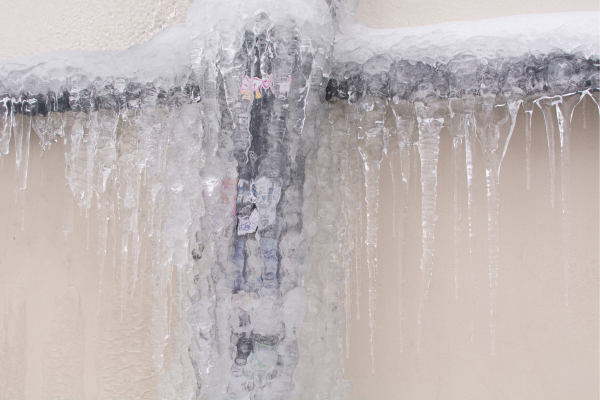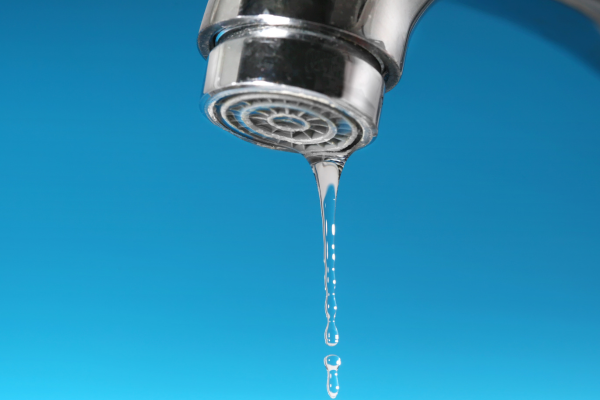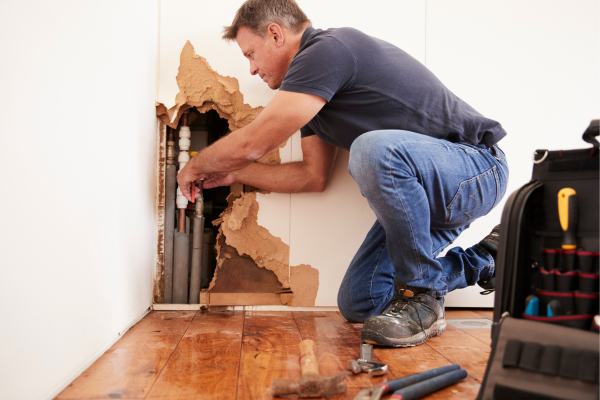Winter Pipe Bursts: An Intro
So, why do pipes burst in the winter? During the winter months, homeowners face the risk of pipes bursting, leading to significant damage to their properties. Burst pipes can cause water to flood areas of the home, resulting in costly repairs, water damage, and even the risk of mold growth if not addressed quickly. This common winter problem can be a nightmare for anyone, disrupting daily life and requiring immediate attention from professionals. The goal of this blog post is to explain the common question of: “why do pipes burst in the winter?”
Winter is the most common time of the year when pipes burst, due to how the cold temperature can affect the plumbing system. It’s very important to know what causes pipes to burst during winter and how to prevent the situation from occurring. Your home is in jeopardy, and to be able to take precautionary measures will save you the hassle and cost involved in a big water leakage. Let’s look at some causes and solutions so you may be able to protect your home this winter.
Why Do Pipes Burst in the Winter? How Cold Weather Affects Pipes
The cold season is just another good opportunity for serious damage to your plumbing system when it is freezing hard outside. The most general reason for pipe bursts during winter is water expansion upon the freezing of water inside the pipes. In such a case, while the water inside the pipes turns into ice, it expands and builds high pressure. If this pressure becomes too hard for the pipe walls, they may crack or burst, releasing the water and thereby causing much damage.
Water starts to freeze inside exposed or inadequately insulated pipes when the temperatures get below zero. It is a real hazard in areas of one’s home where the pipes are going to be less protected against cold, such as outdoor hoses, basements, attics, crawl spaces, and pipes running through uninsulated walls. These places are most susceptible to freezing and bursting; that is why it is a priority for homeowners to undertake some advance precautions to insulate pipes and keep them warm.
Being able to know how the cold weather is going to affect their pipes, they are going to be better prepared for the winter season and therefore learn some of the ways of preventing bursting pipes before such occurs. Ensuring your pipes are properly insulated and protected from extreme cold is the best way to avoid high-cost damages and protect your home from water leaks.
Types of Pipes More Likely to Burst during Winter
Not all pipes are created equal when it comes to withstanding cold temperatures. While some materials increase the likeliness of bursting above others in freezing conditions, others are built to handle the effects of winter weather more favorably. Here’s a look at the different types of pipes and how they fare in the winter months:
- Plastic or PVC Pipes: These are some of the common ones in modern plumbing systems because they are quite inexpensive. On the other hand, PVC pipes are most susceptible to freezing and bursting during winter months since they become very brittle in very low temperatures.
- Copper Pipes: Copper pipes are stronger than PVC; however, they also freeze under the cold weather in winter. That makes copper piping vulnerable to bursting or even cracking if water inside the pipes freezes, since copper piping is vulnerable to expansion and pressure.
- Galvanized Steel Pipes: The galvanized steel pipes are found in the homes that were built several decades ago, and they are not as flexible. If frozen, it may burst. These pipes also corrode over time, which would further make them weaker to leaks when cold weather arrives.
- PEX Pipe: PEX is a new material and has greater flexibility and resistance to bursting. Since it can expand under pressure, it’s much better for states that are quite cold and have freezing.
Knowing what type of pipes you have in your house can also enable you to take due care to prevent freezing and bursting of these pipes during winters.
The Most Common Causes of Burst Pipes During the Winter

Due to winter, several conditions prevail that enhance the possibility of pipes bursting. To understand these various causes homemakers can learn ways how to prevent burst pipes from happening and take proper precautions to safeguard their plumbing systems. Given are the most prevalent causes of pipes bursting during the winter period.
Poor Insulation Can Cause Pipes to Burst in the Winter
The most common causes of pipe bursts during winter are due to improper insulation on the pipes. It’s important to realize that uninsulated, unheated areas such as pipes in basements, crawl spaces, or attics are particularly susceptible to freezing. The colder it is outside, the greater chance there is that the water inside will freeze and expand, resulting in a pipe bursting.
Proper insulation is the good way to avoid freezing. Adding insulation around pipes is amongst the most prevalent and effective ways to avoid pipe bursts, especially in colder areas. Proper insulation of your home’s plumbing can significantly reduce the possibility of any kind of disaster this winter.
Sudden Drops in Temperature
Other major causes of frozen and burst pipes include sudden drops in temperature. The temperatures may drop down so suddenly that the water inside the pipes freezes before the homeowner can take any precautionary measures. This occurs very frequently in instances where there is a cold snap, and the weather changes from mild to freezing within a few hours.
Such pipes are more likely to freeze and burst in areas that face sudden temperature changes. Apart from that, a homeowner may learn how to prevent a burst pipe from occurring, should there be sudden weather changes, by being prepared in advance in the case of potential temperature swings or during insulation of the vulnerable pipes.
Low Water Flow
Low flow in the winter period also predisposes the pipes to freeze. When water is stationary within the pipes, like when water usage has been nil over a certain period, the tendency of freezing increases. This is particularly true at times when homes consume less water due to cold seasons or areas of the home where pipes seldom see use.
And this is how you can prevent freezing, especially during very, very cold periods, by just keeping the water in flow. In fact, yes, during freezing weather, people make use of the trick of letting faucets drip slightly; this keeps the water in motion and reduces its chance of freezing inside the pipes.
High Water Pressure Build-up
Frozen pipes can cause water pressure to increase in other areas of the plumbing system. As the water freezes and blockages occur, the pressure builds up behind the blockage. If this pressure becomes too intense, it may burst the pipe at a point away from the blockage of ice, causing further damage.
The home owner needs to take quick notice of any signs which may prove that freezing is taking place, such as reduced water flow, or rattling, whining, and banging noises in the pipes, in order for them to avoid burst pipes resulting from the build-up of high water pressure inside the pipes. By early detection and giving way to a small, steady flow of water, it will ensure minimal risks of pipe bursting due to high pressure.
Signs Your Pipes Are in Jeopardy of Bursting This Winter
Being able to identify the warning signs that your pipes are in jeopardy of bursting can enable you to take immediate action to avoid costly damages. By staying alert and understanding what to look for, a homeowner can learn how to prevent burst pipes before a major issue occurs. Here are a number of common signs that your pipes may be in danger of freezing or bursting.
Frost on Piping’s Causes Them to Burst in the Winter
If you start to see frost or condensation building up on the outside of your pipes, that is a surefire sign that your pipes are being exposed to freezing temperatures. Where there is frost, the water inside of the pipe may be starting to freeze, which can lead to bursting pipes. To avoid bursting pipes, you will want to take the necessary steps to immediately insulate these pipes. It would also help if the temperature in that area was increased to keep your pipes warm.
Funny Noises from the Pipes
The banging, clanging, and whistling noises coming from your pipes are usually a sign of water pressure or partial freezing. These abnormal sounds occur when the flow of water is disrupted or when there is air trapped inside the pipes. This can create pressure that may subsequently lead to a pipe bursting if not treated. Keeping water flowing and pipes warm will prevent these noises, along with the risk of freezing.
Low Water Pressure
A sudden drop in the level of water pressure is another good sign that your pipes are freezing. This occurs when ice begins to obstruct the flow of water within the pipes. If you experience low water pressure when the temperature is freezing, then it is important that you take immediate action in order to prevent a complete blockage that might be extreme enough to result in the bursting of the pipe. Allowing the faucets to drip and heating the area can help prevent burst pipes by encouraging water to keep moving.
Visible Cracks or Leaks
If you can spot very small cracks or tiny leaks in the pipe, then that is a sign of your pipe straining and possibly about to burst. Even minute cracks in the pipes will expand and become bigger as more water freezes and applies pressure. Repairing such cracks as soon as possible and addressing the cause of freezing is crucial in preventing burst pipes and furthering water damage.
Prevention Tips for Homeowners: How to Prevent Burst Pipes in the Winter
During winter, it is very important that you take proactive steps in protecting your home from burst pipes. Through a number of simple prevention tips, you will manage to cut down the risks of pipes bursting during cold weather. Below are effective ways on how to prevent burst pipes and keeping your plumbing system safe during freezing temperatures.
Insulating Pipes
One of the ways to best prevent burst pipes is through insulating pipes in those areas most vulnerable to freezing: basements, crawl spaces, attics, garages, and along exterior walls. Insulation will keep heat around the pipe and maintain water temperatures from freezing inside them. One can use either pipe insulation sleeves or heat tapes that can be wrapped around unshielded pipes to protect them against cold temperatures. By insulating these crucial regions, you are taking one of the most crucial steps towards learning how to prevent burst pipes and prevent significant resultant damage.
Keeping Water Flowing

Another effective method to prevent pipes from bursting is allowing water to flow through your pipes in case of very cold weather. Allowing the faucets to drip minutely allows water to move through the system and makes it harder for ice to block your pipes. This may be a slow trickle, yet it can prevent that pressure build-up that causes a pipe to burst. Such practice is fairly effective yet inexpensive in preventing burst pipes, especially for homes that are usually subjected to freezing temperatures.
Maintenance of Indoor Temperature
If you can maintain a consistent indoor temperature, this is also an important way to avoid frozen pipes. It is suggested that even if out of town, one should at least maintain one’s thermostat above 55° F. This will help to keep the areas surrounding your pipes warm enough from freezing. Check regularly that all your house is well heated, even rooms and/or basements that are not exploited. In this way, you will be following one of the easiest yet efficient solutions for how to prevent burst pipes.
Shut Off Outdoor Water Supply
Equally vital to prevent pipe bursts is the shutdown and drainage of all outdoor water sources prior to winter. Outdoor faucets, hoses, and sprinklers are much more prone to freeze-up. Disconnect the hoses and turn off the water supply to exterior taps to prevent cold water from resting in the pipes and freezing. If these lines are drained before the temperature drops, freezing and bursting will be avoided, thus protecting the plumbing system of your house from damage it doesn’t deserve.
Temporary vs. Long-Term Solutions to Avoid Pipe Bursts
This set of solutions to the problem of pipe bursts during winter ranges from short-term remedies to long-term solutions. Knowing which type of approach to use can save one from dealing with costly water damage.
Temporary Fixes for Burst Pipes in the Winter
- Let Faucets Drip: Allowing a small drip of water from faucets can keep water moving through the system and prevent pipes from freezing.
- Use Space Heaters: If need be, use space heaters to warm those areas of the home where pipes could be exposed to freezing temperatures.
- Wrap Pipes with Towels: If you happen to be in one of those emergency situations, you can take towels wet from warm water and wrap them around pipes to temporarily hold off freezing.
Long-Term Solutions for Burst Pipes in the Winter
- Pipe Insulation: Proper insulation of pipes, especially in the basement, crawl space, and attic, is the longest-lasting method to prevent burst pipes.
- Wrapping heat tape around the pipes can give the pipes consistent warmth throughout the cold months of the year to prevent freezing.
- Regular plumbing inspection: Get your plumbing checked by a professional at the beginning of winter so that one can uncover which areas of your home’s plumbing are vulnerable thus nip issues in the bud before they get to be actual emergencies.
In the case of an emergency, temporary measures can still work but the permanent ones assure of greater protection against the burst of pipes in winter.
What to Do If a Pipe Bursts: Immediate Steps to Take

Even with the most conscientious prevention, pipes burst due to extreme conditions that arise in winter. If this happens to you in your house, knowing what to do as soon as possible can help minimize the damage.
Here’s what you do immediately:
- Shut off the Main Water Valve: First and most importantly, this is how you stop the water. Locate your main water shut-off valve and rotate it to the off position to stop more water from flooding your home. This will lessen the further risks associated with such damages and will also be easy for the professionals to handle.
- Switch off the electricity supply to the areas: In case of flooding due to water, areas with electric outlets and appliances must not use electricity; this will help avoid electrical hazards. Safety always comes first.
- Call a Professional Plumber: One needs to call a licensed professional plumber who can assess and make the necessary repairs to the burst pipe. Addressing the problem quickly will save one from bigger issues at a later stage.
- Call a Restoration Company: Intrusion of water from a burst pipe can lead to mold growth and structural damage if not dealt with immediately. The best option you have for the removal and drying of water is professionals who will prevent further long-term damages.
While it is essential to know how to prevent burst pipes, knowing what to do when one bursts is just as crucial. Quick action will lessen the impact on your home and save you from extensive repairs.
Why Do Pipes Burst in the Winter? Staying Prepared
Winter burst pipes are all about vigilance and pre-emptive measures. From the insulation of your pipes to keeping the water in flow and indoor temperatures maintained, these prevention tips will go a long way in safeguarding your house against frozen pipes. On the other hand, if a pipe does burst, it is quick action that will limit water damage.
Burst pipes are pretty standard in our water damage repertoire here at Tri-State Ready Restoration. Our team of professionals is prepared to help with the removal and drying process to restore your home to normal. Whether you are experiencing water damage from a burst pipe or would like more information about preventing a burst pipe, we would be glad to hear from you. We will be happy to provide you with the right solution for a winter free from any sort of damage.
Frequently Asked Questions About Winter Pipe Bursts
Q: At what temperature do pipes burst?
When the temperature outside drops as low as 32°F or 0°C, pipes start freezing, but they actually burst at about 20°F or -6°C or lower. The length of time it takes for freezing and subsequent bursting depends on the location of the pipe and if or not it is well insulated.
Q: What should I do if I see frost on my pipes?
Frost on the pipes means that this pipe is already in freezing temperatures. Immediately turn up the heat in that area, or use a space heater in order to keep those pipes warm. You can also wrap them in insulation or towels soaked in warm water to avoid freezing.
Q: After freezing, how soon will pipes burst?
Pipes can take several hours to freeze, but once frozen, pressure can build up rather quickly. The actual burst may not occur right away; it may be hours after the water inside has actually frozen.
Q: Do all pipes have the same freezing and bursting danger?
No. Some materials, like PVC and copper, are more apt to freeze and then burst than others like PEX, which is also flexible and less prone to cold temperature changes.

